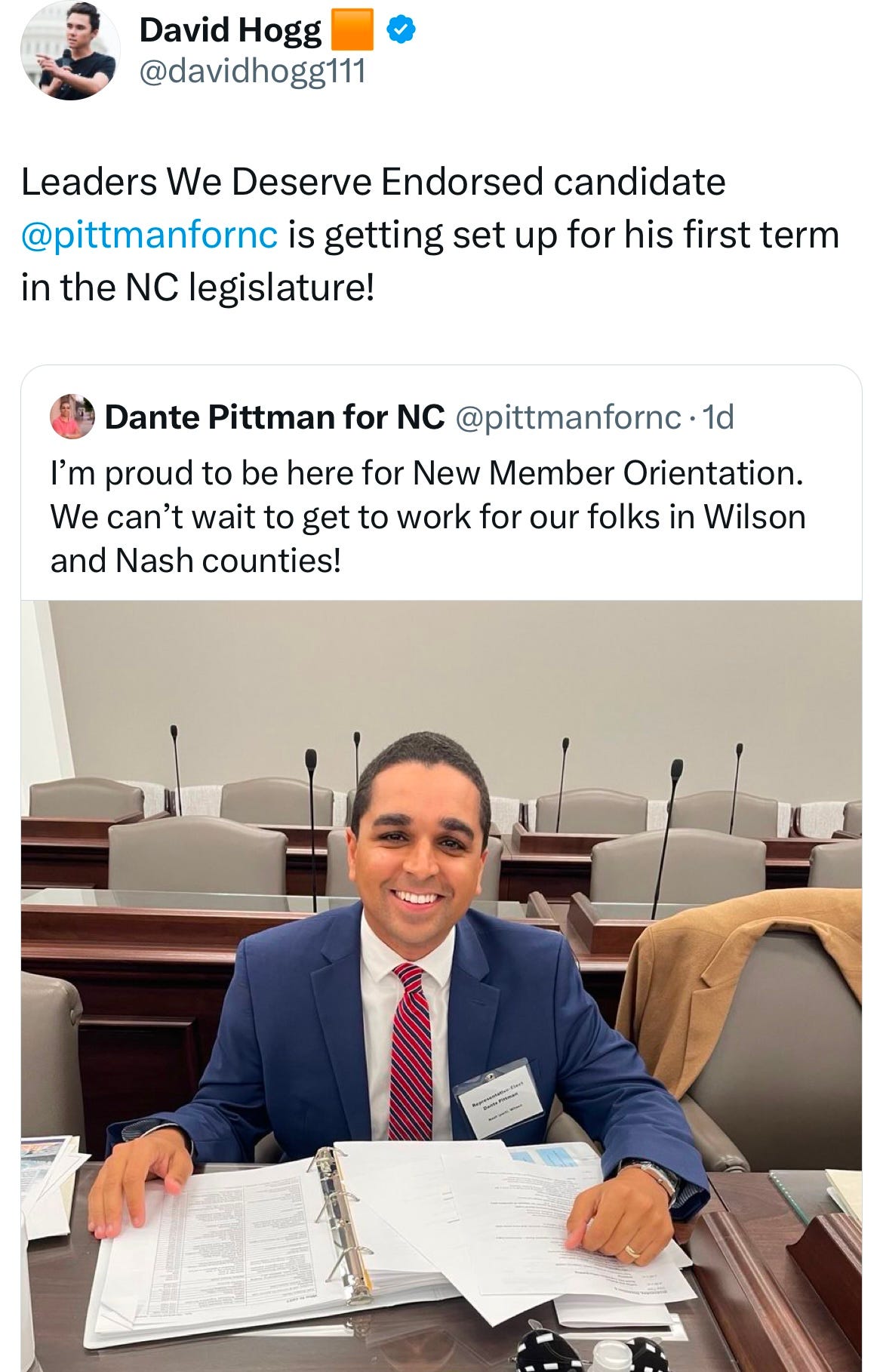Remember this Time Magazine cover?
I sure do. It came out right around the time I agreed to run statewide in Ohio, for State Auditor.
And it came a few months after Obama crushed McCain—part of an election cycle where Democrats won across the board.
Endangered? Extinct?
The GOP was dead, the pundits announced. So much so, Time featured the demise on its cover.
And of course, when I was approached about running for State Auditor (from my perch as a County Commissioner), it was too enticing to say no. Obama and Ohio’s Governor were soaring in Ohio polls, and the party of my opponent was an “endangered species.”
Just being on the statewide ticket was like winning a lottery ticket…right? And if we won, we could finally end the scourge of gerrymandering.
Two years later…
…the GOP was not only not extinct, but stormed back to power. (I lost by 5 points that year, even though I easily outraised my opponent and landed almost every endorsement—while Governor Strickland lost by 2).
How did the GOP turn things around?
As Democrats celebrated their newly won federal power after 2008, Republicans focused like a laser at the state level. Starting with legislative seats, then up from there. They focused even on states that looked to be solidly blue. And they did so at a time when their voters were getting fired up. This all happened while Democrats—again, focused largely on the White House—stayed home in a year where the White House wasn’t at stake.
What’s incredible is, they didn’t even keep this plan a secret. They openly bragged about it! Just look over this old Op-Ed written by Karl Rove in the Wall Street Journal. He couldn’t have been any more clear about what their strategy was. He even called his shot—announcing to the world that their plan was to focus on state legislative seats…and he even explained where they were focusing: “Some of the most important contests this fall will be way down the ballot in communities like Portsmouth, Ohio and West Lafayette, Ind…..”
This op-ed ran on March 4, 2010. And eight months later, the plan played out just as Rove said it would.
Dean’s Fifty-State Strategy
The irony is that Rove’s strategy was built in a very similar way to how Democrats had gained power back only a few years before.
Howard Dean called it the 50-state strategy, and as DNC chair, he introduced it after Democrats were out of power from 2000-2004. NPR provided a simple summary of the plan: “The "50-State Strategy" doesn't just focus on swing states and it doesn't write states off as “unwinnable." Instead, the goal is to campaign throughout the country, and win elections from the ground up.”
And it fueled major success in 2006 and again in 2008, at all levels.
So….when the Republicans faced their low point, a broad and deep state-based strategy fueled a sweeping comeback. And when Democrats acted on this strategy at their low point, the same thing happened.
Hmmm.
I think we’re onto something….
2025: Not Starting from Scratch
But there’s more.
Last month, amid a tough year overall, one of the bright spots was that there were some meaningful victories at the statehouse level.
Democrats ended the Republican supermajority in North Carolina—which means they can now sustain the new Governor’s veto of the GOP’s gerrymandered majority there (the NC GOP is freaking out about this fact).
Even while losing Pennsylvania at the statewide level, Democrats kept their one-seat majority (gained in 2022 by flipping 12 seats) in place at the statehouse level.
Democrats flipped 10 seats in the Wisconsin statehouse, which puts them within striking distance (5 seats) of a new majority in 2026.
Democrats held the Maine house majority by 77-74.
Democrats held the newly gained majority in the Minnesota Senate.
In Ohio, Democrats gained 2 statehouse seats in an otherwise challenging year, including protecting three seats that Trump carried.
There were of course setbacks as well—in Michigan (losing the House majority), Arizona (not gaining the majority), and elsewhere.
Still, the overall direction was far better than in years like 2010. Nothing like the wipeouts of that era. There to fight another day in many of these states.
And this direction wasn’t a fluke. Beyond candidates and in-state efforts themselves, driving the success that did happen at the statehouse level were a set of growing institutions that are laser focused at this critical level of politics, and investing robustly and wisely. There’s the Democratic Legislative Campaign Committee—the official arm of the Democratic Party focused on these races which has grown in stature and capacity in recent years. There’s The States Project—doing incredible work matching donors and their “Giving Circles” with states and statehouse candidates where there is opportunity to gain and/or protect power. And there are other organizations such as Leaders We Deserve (focusing on younger candidates), Sister District and Tech for Campaigns, supporting critical races at these levels.
One other trend: we saw real momentum in 2024 when it came to changing the “business as usual” model (of recent history) of leaving countless districts uncontested—written off, as Dean said, as “unwinnable.” In 2024, individual candidates, organizations and parties and their leaders stepped up their recruiting game so that there were NO uncontested districts in a number of states (Florida, Arizona, Idaho, Wisconsin), only two uncontested seats in North Carolina (playing a key role up and down the ballot), and a good deal fewer uncontested races in many states (Ohio, Texas, Arkansas, etc.).
And there were organizations who stepped up to support the candidates in these tough races, such as Every State Blue chapters (Blue Ohio, Blue Missouri Blue Tennessee), Run for Something and Contest Every Race.
Did it all work in 2024?
Clearly not. Larger forces played a role in overcoming some of these efforts, and the scale of most of these efforts is still not what it needs to be. Other corrections of course can be made.
BUT….the good news is:
we know that the state-level strategy is what’s worked in the past (for both parties)
one of the few bright spots of 2024 were “holds” and wins at the state level
we are seeing more and more infrastructure being built at this level of politics, along with a growing awareness at the grassroots level that engaging at this level—widely—really matters.
Scale It Up
These are challenging times, no doubt.
But if a strategy has consistently worked for both parties in the past, and if there are growing pieces of infrastructure serving that strategy in place, that’s where I’d start our effort to succeed in the next few years…wouldn’t you?
And even better, we have momentum at this level. Many who just ran can and should run again (be sure to thank them, and keep them engaged). The organizations helping lead state-level efforts can keep growing and learning from successes and failures (join them; help them out).
And where we do have the power to govern, we can demonstrate that policies that lift the many and serve the public interest are far better than those that aim to lift a few while undermining the public interest (which we see in gerrymandered red states and are about to see at the federal level).
Our challenge is to scale this all up.
As I often say, this state-level work is core mission stuff when it comes to democracy and freedom—but it’s too often treated as if it’s some peripheral activity on the sidelines of democracy. The JV or middle school team versus the varsity of federal office.
That mindset must change. We must build far broader and deeper support for this approach.
To take advantage of this strategy—and the opportunity that both Howard Dean and Karl Rove saw and seized in their day—the work begins now: recruiting, organizing, connecting with communities.
So if you’re eager about ways you can channel your worry, anger and frustration into a positive pro-democracy direction, this is one clear path you can get going on very soon. Because the next state-level cycle is already under way.
Far more needs to be done, of course. Many lessons learned and improvements made.
But this is where it starts.
If you look at the last several decades, it’s where it usually has.
Day 4 — December 4, 2024 — Chilling
One of the many concerns being raised about Trump’s nominee to serve as FBI director (Kash Patel) is that he has repeatedly promised to use the government to exact revenge on many of Trump’s perceived enemies—and amid his enemies list, he openly includes the media. True to form, only days after his naming by Trump, Patel is already acting on his instinct to stifle media criticism. His attorney wrote a letter to an MSNBC commentator (and former Trump official), threatening legal action because in an interview, she commented he was unqualified for the position, and shared that when she worked with him in the prior Trump White House, he’d displayed a pattern of dishonesty. Patel’s lawyer demanded that she retract her statement within 5 days or face legal consequences.
As one US Senator (Chris Murphy, CT) summarized: “He's basically telling us with this suit that if he's in charge of the FBI, he's using whatever tools he has to come after people who criticize MAGA.”
Yes he is.
This behavior, sadly, works. On another MSNBC show yesterday morning (“Morning Joe”), another guest criticized both Trump’s Defense nominee and his former employer, Fox News. Following those comments, a producer warned him through his earpiece not to repeat the criticism. He didn’t, but he was shortly escorted from the set and studio, and minutes late, one of the hosts of the show apologized on-air for his statement.
The guest detailed what happened here. As he concluded: “I do not write to scold anyone; I write because fear is infectious. Let it spread, and it will paralyze us all.
The only antidote is courage. And that’s infectious, too.”







Morning Joe has collapsed as a trustworthy news site. Shut it off! Patel like ALL the other Trump nominee thugs are more interested in power and control and destroying the institution they are supposed to run than serving anyone but their Dear Leader. Service for the common good mean NOTHING to these THUGS! The Democrats have to stop celebrating when they win, and then forget how they won (like Obama's nationwide approach that was then dismantled and abandoned) and turning on each other when they lose and work on the LONG GAME like the Republicans ARE EVERYDAY! That is why the Republicans have been so successful - in local and state and national elections. And why they NOW have control of the Supreme Court! They are in it for the LONG GAME. Your books speak to this, as does a GREAT book by David Cohen "Dismantling Democracy: The forty-year attack on government, and the long game for the common good".
David, so far I've only read as far as NC. The lame duck GOP supermajority in the NC legislature has overridden Gov. Roy Cooper's veto. They've succeeded in limiting much of Gov-elect Josh Stein's and AG-elect Jeff Jackson's power, and specified that future NC Supreme Court appointments must be from the same party as a retiring justice. I trust there will be lawsuits.